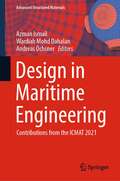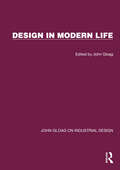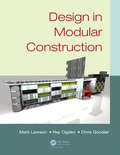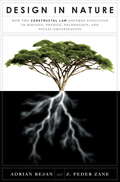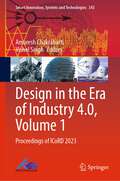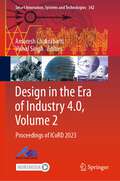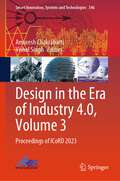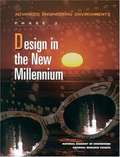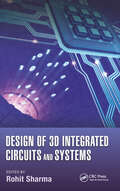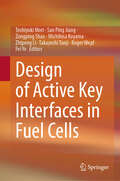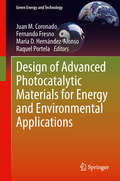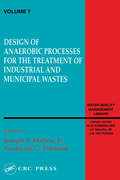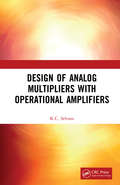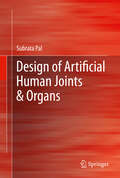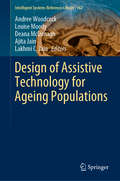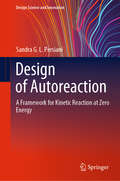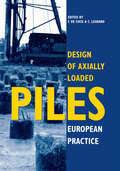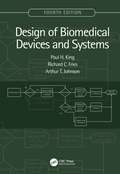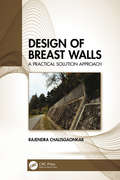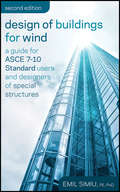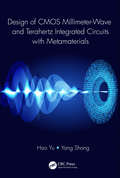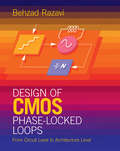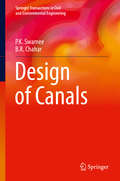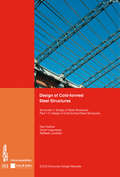- Table View
- List View
Design in Maritime Engineering: Contributions from the ICMAT 2021 (Advanced Structured Materials #167)
by Andreas Öchsner Azman Ismail Wardiah Mohd DahalanThis book covers several research outcomes of various fields and schools related to maritime operation, applications and materials science. Thirty-four research papers have been compiled from the 2nd International Conference on Marine and Advanced Technologies 2021 (ICMAT 2021) which was organized by the Research and Innovation Section of the Universiti Kuala Lumpur-MIMET. The chapters were written by experienced lecturers from various universities in Malaysia discussing various topics and sub-topics related to maritime engineering and materials science. These chapters portray the actual knowledge on the latest developments and trends of technologies in maritime industries.
Design in Modern Life (John Gloag On Industrial Design Ser.)
by John GloagOriginally published in 1946, this book is based on a series of broadcast talks on design. Led by an engineer, an artist and critic of architecture and industrial design, the discussions focussed on the problems that were involved by a general application of design to the environment of contemporary life. It surveys the possibilities of design in modern life and the talks have been rewritten, amplified and revised for the purposes of the book.
Design in Modular Construction
by Mark Lawson Ray Ogden Chris GoodierModular construction can dramatically improve efficiency in construction, through factory production of pre-engineered building units and their delivery to the site either as entire buildings or as substantial elements. The required technology and application are developing rapidly, but design is still in its infancy. Good design requires a knowledge of modular production, installation and interface issues and also an understanding of the economics and client-related benefits which influence design decisions.Looking at eight recent projects, along with background information, this guide gives you coverage of: generic types of module and their application vertical loading, stability and robustness dimensional and spacial planning hybrid construction cladding, services and building physics fire safety and thermal and acoustic performance logistical aspects – such as transport, tolerances and safe installation. A valuable guide for professionals and a thorough introduction for advanced students.
Design in Nature: How the Constructal Law Governs Evolution in Biology, Physics, Technology, and Social Organization
by Adrian Bejan J. Peder ZaneIn this groundbreaking book, Adrian Bejan takes the recurring patterns in nature--trees, tributaries, air passages, neural networks, and lightning bolts--and reveals how a single principle of physics, the Constructal Law, accounts for the evolution of these and all other designs in our world. Everything--from biological life to inanimate systems--generates shape and structure and evolves in a sequence of ever-improving designs in order to facilitate flow. River basins, cardiovascular systems, and bolts of lightning are very efficient flow systems to move a current--of water, blood, or electricity. Likewise, the more complex architecture of animals evolve to cover greater distance per unit of useful energy, or increase their flow across the land. Such designs also appear in human organizations, like the hierarchical "flowcharts" or reporting structures in corporations and political bodies. All are governed by the same principle, known as the Constructal Law, and configure and reconfigure themselves over time to flow more efficiently. Written in an easy style that achieves clarity without sacrificing complexity, Design in Nature is a paradigm-shifting book that will fundamentally transform our understanding of the world around us.
Design in the Era of Industry 4.0, Volume 1: Proceedings of ICoRD 2023 (Smart Innovation, Systems and Technologies #343)
by Amaresh Chakrabarti Vishal SinghThis book showcases cutting-edge research papers from the 9th International Conference on Research into Design (ICoRD 2023) – the largest in India in this area – written by eminent researchers from across the world on design processes, technologies, methods and tools, and their impact on innovation, for supporting design for a connected world. The theme of ICoRD’23 has been ‘Design in the Era of Industry 4.0’. Industry 4.0 signifies the fourth industrial revolution. The first industrial revolution was driven by the introduction of mechanical power such as steam and water engines to replace human and animal labour. The second industrial revolution involved introduction of electrical power and organised labour. The third industrial revolution was powered by introduction of industrial automation. The fourth industrial revolution involves introduction of a combination of technologies to enable connected intelligence and industrial autonomy. The introduction of Industry 4.0 dramatically changes the landscape of innovation, and the way design, the engine of innovation, is carried out. The theme of ICoRD’23 - ‘Design in the Era of Industry 4.0’ –explores how Industry 4.0 concepts and technologies influence the way design is conducted, and how methods, tools, and approaches for supporting design can take advantage of this transformational change that is sweeping across the world. The book is of interest to researchers, professionals, and entrepreneurs working in the areas on industrial design, manufacturing, consumer goods, and industrial management who are interested in the new and emerging methods and tools for design of new products, systems, and services.
Design in the Era of Industry 4.0, Volume 2: Proceedings of ICoRD 2023 (Smart Innovation, Systems and Technologies #342)
by Amaresh Chakrabarti Vishal SinghThis book showcases cutting-edge research papers from the 9th International Conference on Research into Design (ICoRD 2023) – the largest in India in this area – written by eminent researchers from across the world on design processes, technologies, methods and tools, and their impact on innovation, for supporting design for a connected world. The theme of ICoRD’23 has been ‘Design in the Era of Industry 4.0’. Industry 4.0 signifies the fourth industrial revolution. The first industrial revolution was driven by the introduction of mechanical power such as steam and water engines to replace human and animal labour. The second industrial revolution involved introduction of electrical power and organised labour. The third industrial revolution was powered by introduction of industrial automation. The fourth industrial revolution involves introduction of a combination of technologies to enable connected intelligence and industrial autonomy. The introduction of Industry 4.0 dramatically changes the landscape of innovation, and the way design, the engine of innovation, is carried out. The theme of ICoRD’23 - ‘Design in the Era of Industry 4.0’ –explores how Industry 4.0 concepts and technologies influence the way design is conducted, and how methods, tools, and approaches for supporting design can take advantage of this transformational change that is sweeping across the world. The book is of interest to researchers, professionals, and entrepreneurs working in the areas on industrial design, manufacturing, consumer goods, and industrial management who are interested in the new and emerging methods and tools for design of new products, systems, and services.
Design in the Era of Industry 4.0, Volume 3: Proceedings of ICoRD 2023 (Smart Innovation, Systems and Technologies #346)
by Amaresh Chakrabarti Vishal SinghThis book showcases cutting-edge research papers from the 9th International Conference on Research into Design (ICoRD 2023) – the largest in India in this area – written by eminent researchers from across the world on design processes, technologies, methods and tools, and their impact on innovation, for supporting design for a connected world. The theme of ICoRD’23 has been ‘Design in the Era of Industry 4.0’. Industry 4.0 signifies the fourth industrial revolution. The first industrial revolution was driven by the introduction of mechanical power such as steam and water engines to replace human and animal labour. The second industrial revolution involved introduction of electrical power and organised labour. The third industrial revolution was powered by introduction of industrial automation. The fourth industrial revolution involves introduction of a combination of technologies to enable connected intelligence and industrial autonomy. The introduction of Industry 4.0 dramatically changes the landscape of innovation, and the way design, the engine of innovation, is carried out. The theme of ICoRD’23 - ‘Design in the Era of Industry 4.0’ –explores how Industry 4.0 concepts and technologies influence the way design is conducted, and how methods, tools, and approaches for supporting design can take advantage of this transformational change that is sweeping across the world. The book is of interest to researchers, professionals, and entrepreneurs working in the areas on industrial design, manufacturing, consumer goods, and industrial management who are interested in the new and emerging methods and tools for design of new products, systems, and services.
Design in the New Millennium: ADVANCED ENGINEERING ENVIRONMENTS
by National Research Council National Academy of EnegineeringInformation on Design in the New Millennium
Design of 3D Integrated Circuits and Systems (Devices, Circuits, and Systems #33)
by Rohit Sharma and Krzysztof IniewskiThree-dimensional (3D) integration of microsystems and subsystems has become essential to the future of semiconductor technology development. 3D integration requires a greater understanding of several interconnected systems stacked over each other. While this vertical growth profoundly increases the system functionality, it also exponentially increases the design complexity. Design of 3D Integrated Circuits and Systems tackles all aspects of 3D integration, including 3D circuit and system design, new processes and simulation techniques, alternative communication schemes for 3D circuits and systems, application of novel materials for 3D systems, and the thermal challenges to restrict power dissipation and improve performance of 3D systems. Containing contributions from experts in industry as well as academia, this authoritative text: Illustrates different 3D integration approaches, such as die-to-die, die-to-wafer, and wafer-to-wafer Discusses the use of interposer technology and the role of Through-Silicon Vias (TSVs) Presents the latest improvements in three major fields of thermal management for multiprocessor systems-on-chip (MPSoCs) Explores ThruChip Interface (TCI), NAND flash memory stacking, and emerging applications Describes large-scale integration testing and state-of-the-art low-power testing solutions Complete with experimental results of chip-level 3D integration schemes tested at IBM and case studies on advanced complementary metal–oxide–semiconductor (CMOS) integration for 3D integrated circuits (ICs), Design of 3D Integrated Circuits and Systems is a practical reference that not only covers a wealth of design issues encountered in 3D integration but also demonstrates their impact on the efficiency of 3D systems.
Design of Active Key Interfaces in Fuel Cells
by San Ping Jiang Toshiyuki Mori Michihisa Koyama Zongping Shao Zhipeng Li Takayoshi Tanji Roger Wepf Fei YeThis book focuses on the multidisciplinary teamwork for the design of key interfaces in fuel cell devices. It covers the fabrication, modelling, and operando-microanalysis sections in each chapter. Also, each chapter in the book consists of the introduction of basic theory, representative experimental results, and future prospects in each field. The book is an edited volume, intended to serve as an introductory textbook in multidisciplinary research work for the design and development of fuel cells. To fully enjoy the multidisciplinary research activities in fuel cell field, the beginners need to learn the basic knowledge and experimental data in each field. Compared with the published introductory textbooks in the field of science and engineering of fuel cells, this book has the following advantages. Firstly, it is an introductory textbook of multidisciplinary work for the design and development field of intermediate temperature (IT) solid oxide fuel cells (IT-SOFCs) and high-temperature polymer electrolyte fuel cells (HT-PEFCs) . And at the same time, this book is convenient for practical research implementation in R & D of those IT-SOFC and HT-PEFC devices. Secondly recent research topics with sufficient references are included in each chapter. Scientists and engineers in the fuel cell field will obtain useful knowledge in critical review chapters in the fabrication, modeling, and operando-microanalysis fields. Finally experimental results are closely combined with the cutting edge of scientific research work in the IT-SOFC and HT-PEFC materials and devices field. For all these reasons, this book is a useful start-up in multidisciplinary work for R & D of IT-SOFC and HT-PEFC devices.
Design of Adhesive Joints Under Humid Conditions
by Lucas F. Silva Chiaki SatoThis book describes most recent advances and limitations concerning design of adhesive joints under humid conditions and discusses future trends. It presents new approaches to predict the failure load after exposure to load, temperature and humidity over a long period of time. With the rapid increase in numerical computing power there have been attempts to formalize the different environmental contributions in order to provide a procedure to predict assembly durability, based on an initial identification of diffusion coefficients and mechanical parameters for both the adhesive and the interface. A coupled numerical model for the joint of interest is then constructed and this allows local water content to be defined and resulting changes in adhesive and interface properties to be predicted.
Design of Advanced Photocatalytic Materials for Energy and Environmental Applications
by Raquel Portela María D. Hernández-Alonso Fernando Fresno Juan M. CoronadoResearch for the development of more efficient photocatalysts has experienced an almost exponential growth since its popularization in early 1970's. Despite the advantages of the widely used TiO2, the yield of the conversion of sun power into chemical energy that can be achieved with this material is limited prompting the research and development of a number of structural, morphological and chemical modifications of TiO2 , as well as a number of novel photocatalysts with very different composition. Design of Advanced Photocatalytic Materials for Energy and Environmental Applications provides a systematic account of the current understanding of the relationships between the physicochemical properties of the catalysts and photoactivity. The already long list of photocatalysts phases and their modifications is increasing day by day. By approaching this field from a material sciences angle, an integrated view allows readers to consider the diversity of photocatalysts globally and in connection with other technologies. Design of Advanced Photocatalytic Materials for Energy and Environmental Applications provides a valuable road-map, outlining the common principles lying behind the diversity of materials, but also delimiting the imprecise border between the contrasted results and the most speculative studies. This broad approach makes it ideal for specialist but also for engineers, researchers and students in related fields.
Design of Anaerobic Processes for Treatment of Industrial and Muncipal Waste, Volume VII (Water Quality Management Library #Vol. 7)
by Joseph MalinaPrinciples, methods, and calculations for evaluating, designing and operating anaerobic systems
Design of Analog Multipliers with Operational Amplifiers
by K.C. SelvamDesign of analog multipliers discusses what an analog multiplier and its related types is, how different types of analog multipliers are implemented with analog two to one multiplexers and op-amps, and how the types of analog multipliers are implemented with transistors and op-amps. Describing forty-eight analog multiplier circuits, book explains six building blocks as integrator, comparator, switch, low pass filter, peak detector and sample & hold circuit. All analog multiplier circuits presented in this book use a maximum of four operational amplifiers which will enable the readers to simulate the multipliers with minimum number of components and use for their application at low cost.
Design of Artificial Human Joints & Organs
by Subrata PalDesign of Artificial Human Joints & Organs is intended to present the basics of the normal systems and how, due to aging, diseases or trauma, body parts may need to be replaced with manmade materials. The movement of the body generates forces in various work situations and also internally at various joints, muscles and ligaments. It is essential to figure out the forces, moments, pressure etc to design replacements that manage these stresses without breaking down. The mechanical characterization of the hard and the soft tissues are presented systematically using the principles of solid mechanics. The viscoelastic properties of the tissue will also discussed. This text covers the design science and methodology from concept to blueprint to the final component being replaced. Each chapter will be a brief overview of various joint/organ replacement systems. Engineers working on artificial joints and organs, as well as students of Mechanical Engineering and Biomedical Engineering are the main intended audience, however, the pedagogy is simple enough for those who are learning the subject for the first time.
Design of Assistive Technology for Ageing Populations (Intelligent Systems Reference Library #167)
by Lakhmi C. Jain Louise Moody Andree Woodcock Deana McDonagh Ajita JainThis book focuses on various aspects of research on aging, including in relation to assistive technology; dignity of aging; how technology can support a greater understanding of the experience of physically aging and cognitive changes; mobility issues associated with the elderly; and emerging technologies. The 80+ age group represents an expanding market, with an estimated worth of £21.4 billion a year. Everyone is affected by this shift in demographics – we are getting older and may become carers – and we need to prepare ourselves and adjust our surroundings for longer life. Products, services and environments have been changing in response to the changing population. Presenting international design research to demonstrate the thinking and ideas shaping design, this book is a valuable resource for designers; product developers; employers; gerontologists; and medical, health and service providers; as well as everyone interested in aging.
Design of Autoreaction: A Framework for Kinetic Reaction at Zero Energy (Design Science and Innovation)
by Sandra G.L. PersianiThis book provides the readers with a timely guide to the application and integration of interdisciplinary principles from the fields of kinetic design, mechanics, energy and materials engineering in the fields of architecture and engineering design. It explores the potential integration of autoreactive solutions, unpowered kinetic systems triggered by changes in the surrounding latent energy conditions, within man-made artefacts with added functionality and efficiency. Related interdisciplinary parameters are explored discussing morphology, mechanics, energy and materials in detail. Each chapter examines the implications of autoreactivity in one specific field, providing a general overview and listing relevant motion design parameters and identifying for the reader those aspects that have a high potential to open up for new design directions. The book guides readers through a highly multidisciplinary field of design, offering an extraordinary resource of knowledge for professional architects, engineers and designers, as well as for university teachers, researchers and students. Interdisciplinary research is presented throughout the book as a powerful resource that can serve architecture and design, and a learning method to rethink innovative, optimal and sustainable solutions.
Design of Axially Loaded Piles - European Practice: Proceedings of an ERTC-3 seminar, Brussels, 17-18 April 1997
by F. De CockThis book is unique on the subject because it is not so much a collection of individual work, but basically comprising national reports from most European countries on the present-day design methods, as prescribed in more or less strict national codes or recommendations and so daily used in practice by consulting engineers and contractors. As far as already implemented, the application of these methods within the framework of Eurocode 7 is described as well. In order to improve the understanding of the design methods, the national papers also consider aspects such as the local piling practice, limitations of the design methods, some practical examples and particular national experiences. The proceedings also include the contributions of two invited speakers as well as those of the three session discussion leaders, focusing on some particular aspects with regards to pile design. The book is of particular interest for those who are involved with pile design in practice, consulting engineers, piling contractors, control organisms as well as those dealing with geotechnical normalisation and research work.
Design of Biomedical Devices and Systems, 4th edition
by Paul H. King Richard C. Fries Arthur T. JohnsonThis will be a substantial revision of a highly regarded text, intended for senior design capstone courses within departments of biomedical engineering, bioengineering, biological engineering and medical engineering, worldwide. Each chapter will be thoroughly updated and revised to reflect the latest developments. New material will be added on entrepreneurship, bioengineering statistics, clinical trials and CRISPR. New examples, applications and problems will be added in each chapter.There will be strong efforts made to increase the number of clinical applications to enhance the overall relevance of the material that's presented. Significant new material added on FDA regulations.
Design of Breast Walls: A Practical Solution Approach
by Rajendra ChalisgaonkarThe design of breast walls is important parameter for various earth-retaining purposes, and many problems are encountered in the field as a result of improper design and the proper explanation of parameters which influence the technoeconomic designs is required. The book provides insight into the design of retaining walls by explaining the basics of earth pressure theories, the parameters influencing earth pressures, gravity vis-à-vis breast walls and tables and charts for designing stone masonry and concrete breast walls across eight chapters. Details of the analysis are tabulated to aid professional engineers or designers in their practical work. FEATURES Basic principles, design methodology, the influence of various parameters on design and construction features Technoeconomical designs for various combinations of pertinent parameters How to design masonry and concrete walls Design principles and methodologies of designing breast walls with illustrative examples and construction features Design charts and tables for ease of access and a quick design process of breast walls This volume is aimed at professionals in civil engineering, geotechnical engineering, retaining walls, soil mechanics and foundation engineering, as well as engineers working in the highway, water resources and construction sectors.
Design of Buildings for Wind
by Emil SimiuASCE 7 is the US standard for identifying minimum design loads for buildings and other structures. ASCE 7 covers many load types, of which wind is one. The purpose of this book is to provide structural and architectural engineers with the practical state-of-the-art knowledge and tools needed for designing and retrofitting buildings for wind loads. The book will also cover wind-induced loss estimation. This new edition include a guide to the thoroughly revised, 2010 version of the ASCE 7 Standard provisions for wind loads; incorporate major advances achieved in recent years in the design of tall buildings for wind; present material on retrofitting and loss estimation; and improve the presentation of the material to increase its usefulness to structural engineers.Key features:New focus on tall buildings helps make the analysis and design guidance easier and less complex.Covers the new simplified design methods of ASCE 7-10, guiding designers to clearly understand the spirit and letter of the provisions and use the design methods with confidence and ease.Includes new coverage of retrofitting for wind load resistance and loss estimation from hurricane winds.Thoroughly revised and updated to conform with current practice and research.
Design of CMOS Millimeter-Wave and Terahertz Integrated Circuits with Metamaterials
by Hao Yu Yang ShangThis book shows that with the use of metamaterials, one can have coherent THz signal generation, amplification, transmission, and detection for phase-arrayed CMOS transistors with significantly improved performance. Offering detailed coverage from device to system, the book describes the design and application of metamaterials in actual CMOS integrated circuits, includes real circuit examples and chip demonstrations with measurement results, and also evaluates system performance after CMOS-based system-on-chip integration. The book reflects the latest research progress and provides a state-of-the-art reference on CMOS-based metamaterial devices and mm-wave and THz systems.
Design of CMOS Phase-Locked Loops: From Circuit Level to Architecture Level
by Behzad RazaviUsing a modern, pedagogical approach, this textbook gives students and engineers a comprehensive and rigorous knowledge of CMOS phase-locked loop (PLL) design for a wide range of applications. It features intuitive presentation of theoretical concepts, built up gradually from their simplest form to more practical systems; broad coverage of key topics, including oscillators, phase noise, analog PLLs, digital PLLs, RF synthesizers, delay-locked loops, clock and data recovery circuits, and frequency dividers; tutorial chapters on high-performance oscillator design, covering fundamentals to advanced topologies; and extensive use of circuit simulations to teach design mentality, highlight design flaws, and connect theory with practice. Including over 200 thought-provoking examples highlighting best practices and common pitfalls, 250 end-of-chapter homework problems to test and enhance the readers' understanding, and solutions and lecture slides for instructors, this is the perfect text for senior undergraduate and graduate-level students and professional engineers who want an in-depth understanding of PLL design.
Design of Canals
by P. K. Swamee B. R. ChaharThe book presents firsthand material from the authors on design of hydraulic canals. The book discusses elements of design based on principles of hydraulic flow through canals. It covers optimization of design based on usage requirements and economic constraints. The book includes explicit design equations and design procedures along with design examples for varied cases. With its comprehensive coverage of the principles of hydraulic canal design, this book will prove useful to students, researchers and practicing engineers. End-of-chapter pedagogical elements make it ideal for use in graduate courses on hydraulic structures offered by most civil engineering departments across the world.
Design of Cold-formed Steel Structures: Eurocode 3: Design of Steel Structures. Part 1-3 Design of cold-formed Steel Structures
by Dan Dubina Viorel Ungureanu Raffaele LandolfoThe book is concerned with design of cold-formed steel structures in building based on the Eurocode 3 package, particularly on EN 1993-1-3. It contains the essentials of theoretical background and design rules for cold-formed steel sections and sheeting, members and connections for building applications. Elaborated examples and design applications - more than 200 pages - are included in the respective chapters in order to provide a better understanding to the reader.
